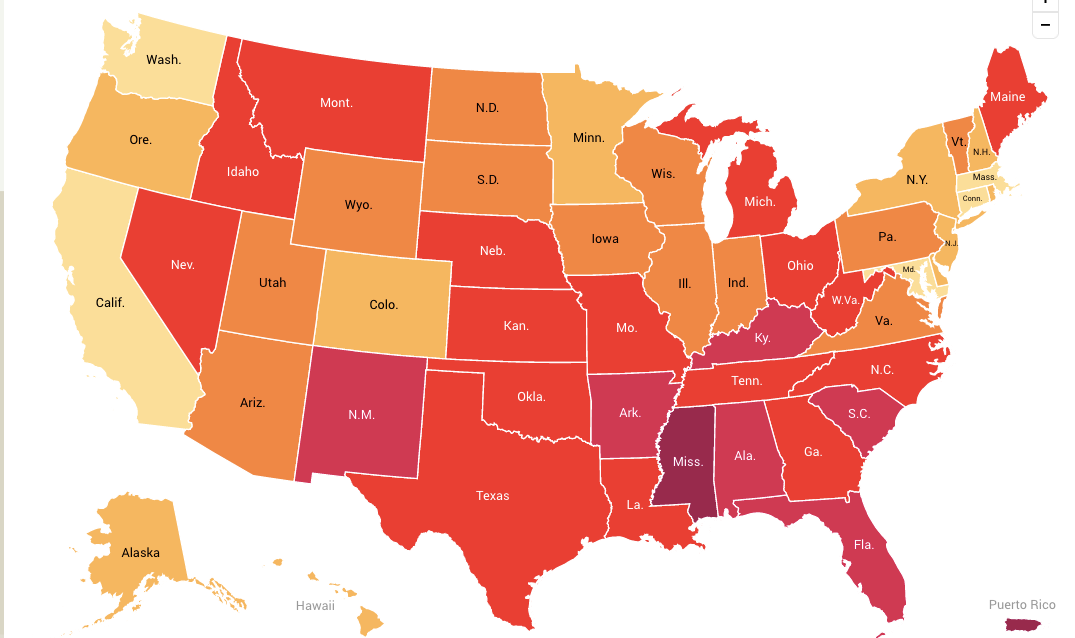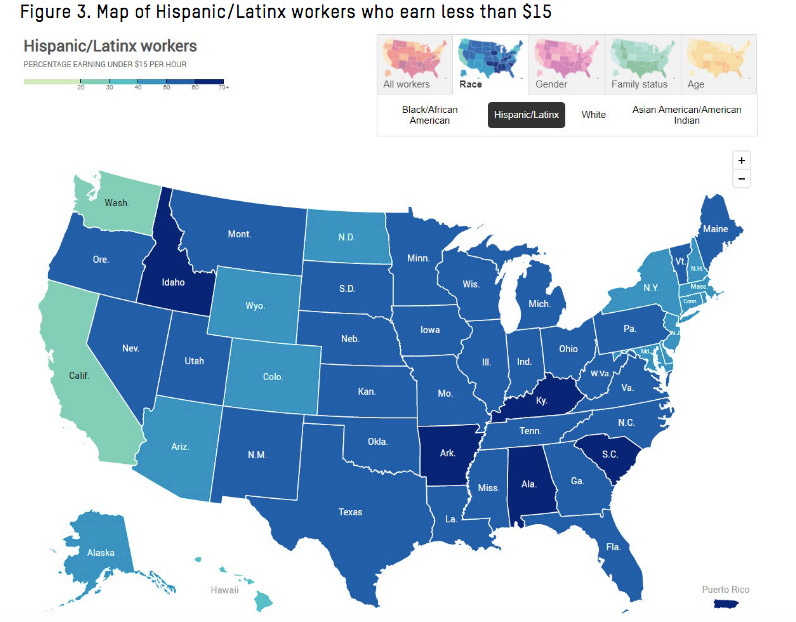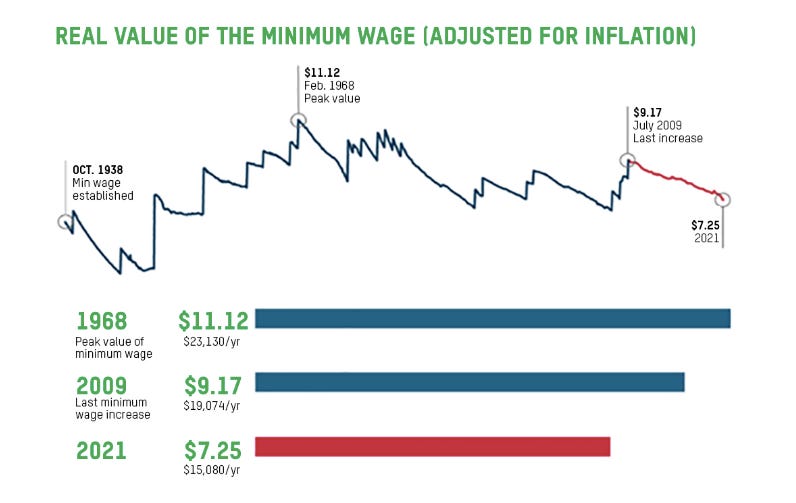(Readers! Shortish issue this week—big deadlines on three, ahem, *paying* projects! I know, you’re sad)
LONG TAKE
American Exceptionalism is quite something to behold. Empire is praised—and well-funded (see: ballooning Pentagon budgets embraced by overwhelming majorities of both parties in Congress)—partly by foisting up an image of workers in the U.S. being so much more superior than workers elsewhere (a racist mantra, by the way, that has been central to a broad spectrum of bloviators from the always-wrong Larry Kudlow to the faux progressive Robert Reich).
Except that the reverence shown workers in the U.S. stops exactly at the fine line demarcating propaganda from the actual gross amount written on most workers’ paychecks.
No surprise to my readers—this is a country where the wealth of a few, and the profits of corporations, is powered by low wages.
Now, for your use, lots of good data and info in one place, courtesy of Oxfam. The organization has a pretty extensive report on “The crisis of low wages in the U.S.” I’ll touch on some of it and link to pieces. I think this is a good document for everyone to spread around or keep in your arsenal for understanding what workers face.
It also should be a political gold mine for people who want to reach into communities not linked to progressive politics. And you will see why.
To wit: check this map out (and you can actually play with the interactive aspect of the map here).
What is abundantly clear: the country is divided into two parts—states where workers get paid significantly above the poverty-level federal minimum wage of $7.25-per-hour because of a higher state minimum wage versus states where workers get paid at right about $7.25-per-hour.
And the discerning eye will see that, generally speaking, the better pay is in so-called “blue” states.
I do always want to make the point that the demand to raise the federal minimum wage to $15-an-hour shows how pathetic wages truly are:
If you look at productivity over the past four decades, the federal minimum wage should be somewhere between $20-$22-hour—that, my friends, is a sign of how deep the robbery has been.
Even if the federal minimum wage was raised to $15-an-hour, that is not some bounty of great riches—if you work 40 hours a week for 52 weeks a year (meaning, not a single day off), someone working for $15-an-hour would earn a gross income of $31,200—which is below the federal poverty line for a family of 5 and just a bit over the federal poverty line for a family of 4.
Speaking of politics, you’ve probably read the endless hand-wringing by Democrats about the erosion of support among Latinos. Look at this illustration of wages for Hispanic/Latinx workers:
It’s a racist travesty and you might wonder: wouldn’t this be a singular issue to run on? Meaning, vote for people who are pushing to get the minimum wage—at the state level and federally—at least up to $15-per-hour. In fact, I pointed out right after the 2020 election that the ballot initiative in FLORIDA to raise the minimum wage to $15-per hour ran ahead of Joe Biden in every single district in the state—and among every single voting group.
Share
How has the minimum wage held up compared to inflation?
So, check out the entire report.
SHORT TAKES
Why Should You Pay For Bezos To Go The Moon?
The obvious answer is: you shouldn’t. It’s part of the larger question: why are the damn Congresscritters, of both parties, continuing to hand over OUR money—meaning, tax dollars—to very rich people and very rich corporations?
Yes, that’s kind of a rhetorical question. We know exactly why this is happening: the legalized corruption of campaign contributions.
I’ve written about this is a previous issue of the newsletter—there is a move afoot to hand over $52 BILLION—that’s Billion with a B—in subsidies to the micro-chip industry.
To an industry that is hugely profitable—and, generally speaking, is non-union and pays its workers pennies (mainly those in slave-like countries that are home to chip manufacturing plants).
And part of the scam in trying to ram this through is straight from the “national security” argument playbook—it’s all being dressed up as “essential” to “compete” with China.
And along for that ride is Jeff Bezos who is also managing to dip his hand into every taxpayer’s pocket for a moon-ride subsidy.
I will let Bernie Sanders tell most of this story via his speech on the Senate floor yesterday explaining why he was blocking those subsidies (or, in Senate parlance, putting a “hold” on the legislation):
We are talking about an industry that has shut down over 780 manufacturing plants in the United States and eliminated 150,000 American jobs over the last 20 years while moving most of its production overseas.
In other words, in order to make more profits, these companies shut down plants in America and hired cheap labor abroad. And now, believe it or not, these very same companies are in line to receive $53 billion in corporate welfare to undo the damage that they did.
Do we need to expand the enormously important microchip industry in this country so that we become less dependent on foreign nations? Absolutely. But we can accomplish that goal without throwing money at these companies with no protections for the taxpayer.
And:
I suspect 5 major semi-conductor companies will likely receive the lion’s share of this taxpayer handout: Intel, Texas Instruments, Micron Technology, Global Foundries, and Samsung.
These 5 companies made over $75 billion in profits last year.
The company that will likely benefit the most from this taxpayer assistance is Intel. Let’s be clear. Intel is not a poor company. It is not going broke.
In 2021, Intel made nearly $20 billion in profits.
We’re talking about a company that had enough money to spend $14.2 billion during the pandemic, not on research and development, but on buying back its own stock to reward their executives and wealthy shareholders.
We’re talking about a company that could afford to give its CEO, Pat Gelsinger, a $116 million compensation package last year.
We’re talking about a company that could afford to spend over $100 million on lobbying and campaign contributions over the past 20 years.
We’re talking about a company whose CEO in 2003, Andy Grove, said that he had “no choice” but to continue to move jobs overseas as he predicted that the U.S. would lose the bulk of its information technology jobs to China and India – which we have.
Do we really think that a highly profitable corporation like Intel needs a taxpayer bailout worth many billions of dollars with no strings attached?
Another company that will receive taxpayer assistance under this legislation is Texas Instruments.
Last year, Texas Instruments made $7.8 billion in profits. In 2020, this company spent $2.5 billion buying back its own stock while it has outsourced thousands of good-paying American jobs to low-wage countries and spent more than $40 million on lobbying over the past 20 years. [emphasis added]
And:
The second amendment that I have introduced would simply eliminate the $10 billion bailout for Jeff Bezos to fly to the moon. If Mr. Bezos wants to go to the moon, good for him. He has $186 billion in personal wealth. He became $81 billion richer during the pandemic. He is the second richest person in America. And, in a given year, Mr. Bezos has paid nothing in federal income taxes.
If he wants to go to the moon, let him use his own money, not U.S. taxpayers. [emphasis added]
That last sentence would, I suspect, get 90 percent approval from voters no matter the party.
Share
Elections Matter Redux
I have repeatedly made two points: I agree with so many people about the deep corruption riddling the two-party system AND it does matter, in the short term, for a lot of people who runs the show.
Here’s another example. The Department of Labor—run now by Marty Walsh, a former union leader in Boston (and, yes, the former mayor of the city)—just rolled out a set of tools to help worker stop companies from stealing their wages and retaliating against workers when they try to get their due.
Wage theft is a daily cancer in the country largely because workers don’t have a union and so each worker has to fight alone to make sure she gets paid what’s coming to them and risk getting fired if she sees missing money in a paycheck (for example, overtime pay) and raises a stink.
Here’s an example:
A federal court has ordered an Upper Darby home healthcare agency to pay $4,544,872 in back wages and liquidated damages after U.S. Department of Labor investigators found that the employer misclassified some workers as independent contractors, which denied 503 home health aides their rightfully earned overtime wages.
Following litigation of the case by the department’s Office of the Solicitor, the U.S. District Court for the Eastern District of Pennsylvania entered a consent judgment on March 4 that requires Successful Aging Care Net Inc. and its owner Innocent Onwubiko to pay $2,272,436 in back wages and an equal amount in liquidated damages to the affected workers. The court granted summary judgment to the department on several key issues previously, including finding Successful Aging and Onwubiko liable for overtime and recordkeeping violations of the Fair Labor Standards Act.
Or this:
A federal court in Virginia has entered a judgment ordering a Norfolk-based medical staffing agency, which intentionally violated federal laws and denied 1,105 certified nursing aides, licensed practical nurses and registered nurses their rightfully earned overtime wages, to pay more than $7.2 million in back wages and liquidated damages.
The judgment in the U.S. District Court for the Eastern District of Virginia-Norfolk Division requires Medical Staffing of America LLC – doing business as Steadfast Medical Staffing – to pay at least $3,619,716 in back wages and at least $3,619,716 in liquidated damages to 1,105 employees. The court ordered the department’s Solicitor of Labor to update the back wages to the present, which will likely increase the back wages and liquidated damages amounts substantially. The action follows an investigation by the U.S. Department of Labor’s Wage and Hour Division and litigation by the Solicitor of Labor.
“When employers misclassify employees as independent contractors and fail to pay workers their hard-earned wages, the U.S. Department of Labor will hold them legally accountable,” said U.S. Secretary of Labor Marty Walsh. “In this case, Medical Staffing of America LLC willfully violated the law and shortchanged more than 1,100 aides and nurses of their rightful wages. The court’s judgement means we can finally recover these essential workers’ wages.” [emphasis added]
Or related to workers’ rights:
One of New Jersey’s most flagrant violators of federal workplace safety laws – who continually puts workers at risk of serious injuries or worse – is personally liable for $2 million in penalties assessed by the U.S. Department of Labor’s Occupational Safety and Health Administration, a federal administrative law judge has ruled.
The judge, with the independent Occupational Safety and Health Review Commission, granted the department’s motion for summary judgment against Palisades Park contractor Juan Quevedo-Garcia, owner and principal of BB Frame LLC, following five OSHA inspections at four Bergen County worksites beginning in December 2019. Violations found during these inspections led OSHA to propose $2,004,225 in penalties against BB Frame LLC, and Quevedo-Garcia individually.
The only point here is this: Are we close to ending the immoral free market system, supported by both political parties, that has ripped off generations of workers? No. But, in the hands of a government run by say Ted Cruz, thousands of workers would never get back real money into their pockets, or have a slightly safer workplace, because there would simply be no action by the Labor Department to enforce basic wage and safety and health laws.
And that matters on a day-to-day basis to people who are trying to pay the bills today and hoping to go to work in the morning and come home safely at the end of the day. That’s both smart politics—people want to see something tangible change in their lives, not just hear streams of rhetoric—and, frankly, progressive because it’s progress to improve plenty of peoples’ lives right now.
Share
Leave a comment
Share Working Life Newsletter




